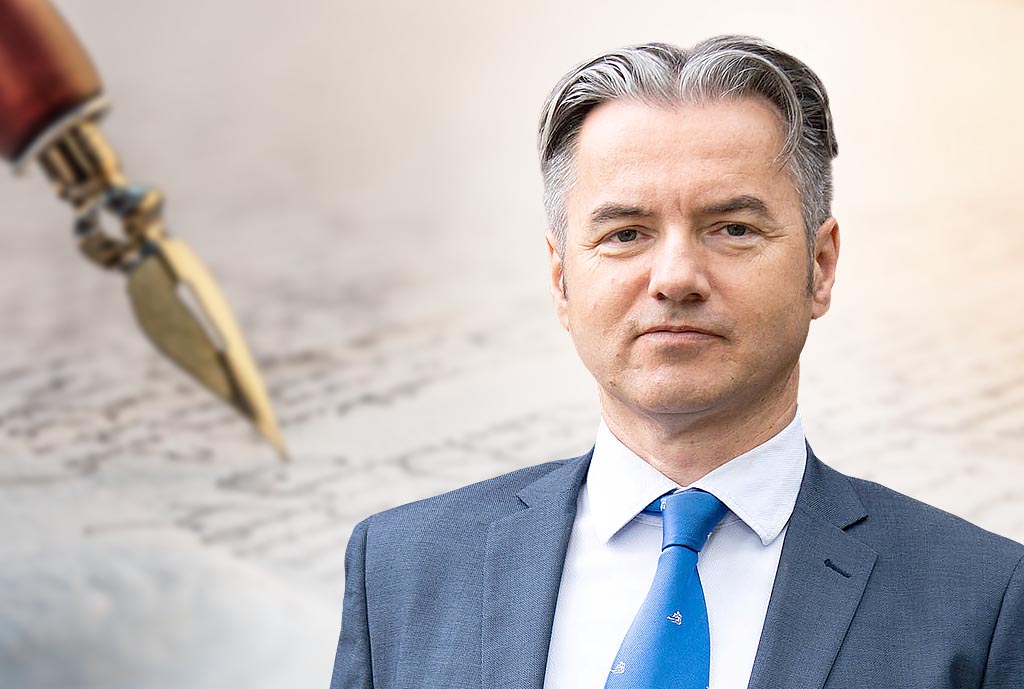By: Dr Metod Berlec
The scandal related to the purchase of a deteriorating building “for the needs of justice”, and the intra-coalition conflict between the parties Gibanje Svoboda and SD, as well as Golob’s slicing of SD “like salami”, is already influencing public opinion in Slovenia.
If we believe the Mediana poll conducted for the newspaper Delo, in the parliamentary elections, the Slovenian Democratic Party (SDS) under the leadership of Janez Janša would receive the most votes, with 23.7% of respondents choosing it. This is two percentage points higher than a month ago. The Gibanje Svoboda party would be chosen by 16.8% of respondents this time (compared to 14.4% the previous month). The Levica party would receive the votes of 5.3% of respondents, slightly up from the previous measurement. NSi party would get 5.1%, up from 4.6% the previous month. The SD party found themselves in fifth place, with only 2.6% of respondents choosing them, compared to 7.5% in the previous measurement. This means that the party would not enter the parliament. The evaluation of the government’s work is currently the lowest in this term. 55% of respondents see Golob’s government’s work negatively (compared to 47% in January), around 28% see it as average (compared to 30% in January), and less than 15% see it positively (compared to 20% in January). The respondents gave the government an average rating of 2.28 (compared to 2.55 in January) and the National Assembly 2.40 (compared to 2.62 in January). Consequently, the SD decided on Monday to hold a congress in April.
The agony of Golob’s government has entered a new phase, as stated in the previous issue of Demokracija. With each passing week, it only intensifies with corruption and clientelist affairs. In the current issue of the magazine, it is pointed out that while the government coalition is preoccupied with internal conflicts, and various professionals such as doctors, judges, prosecutors, administrative workers, and others have been on strike for weeks, Prime Minister Robert Golob behaves as if these problems do not concern him. He does not even talk about them anymore. According to experts, he is almost more on vacation with his partner Tina Gaber than at his workplace. The state is literally “in free fall”. His attitude towards governance is best illustrated by a comment from one of the followers on the X network, stating that “Golob will move only when tourist agencies go on strike, and he cannot go on vacation anymore”. The commenter labelled him a “tourist from Gregorčičeva Street”. Golob ignores everything, only interested in political reprisals and energy-related business and profits. He does not even concern himself with the fact that the Statistical Office of the Republic of Slovenia announced on Friday that industrial production in Slovenia declined by 5.3% last year. There was an exceptionally strong decline in December when industrial production decreased by 10.2% compared to the same month in the previous year. It is important to note that the German economy is cooling down, which will subsequently affect the Slovenian economy strongly tied to it. All of this will be reflected in economic growth, lower GDP growth, fewer job opportunities, and increased unemployment.
IN THE COMING DAYS OR WEEKS, IT WILL BECOME CLEAR IN WHICH DIRECTION KUČAN’S INTERVENTION WENT THIS TIME AND WHETHER GOLOB LISTENED TO HIM.
But let’s return to the question we posed in the previous editorial: whether the godfathers from the shadows will succeed in stopping the agony of Golob’s government. Will the “external centres of power” actively intervene, as has happened in the past, as it is clear that the current chaotic situation is causing long-term harm to the entire transitional left? According to our information, this already happened at the end of last week. Prime Minister Robert Golob met with the last party leader and the first president of the republic, Milan Kučan, in government offices. A man considered the godfather from the shadows, a leading representative of the “external centres of power” operating outside official institutions. A person who, despite leaving the presidential office over two decades ago, still influences key movements in the transitional left. When he visited the then Prime Minister Alenka Bratušek in government offices in early April 2014 (in a similar manner), she announced a month later that she was resigning from the position of prime minister. Her non-election as the president of Positive Slovenia, which was again taken over by Zoran Janković, also contributed to her resignation. However, Kučan is said to have played a crucial role at that time. Will it be the same this time? In the coming days or weeks, it will become clear in which direction Kučan’s intervention went this time and whether Golob listened to him. Will he step aside in favour of the “left option”” or will he continue to stubbornly move forward? Will he try to navigate the sinking boat away from the peril he led it into? Will the current Finance Minister and Deputy Prime Minister Klemen Bostjančić, who has occasionally led the government in the absence of the uninterested Golob, replace him as the prime minister? We will see…

